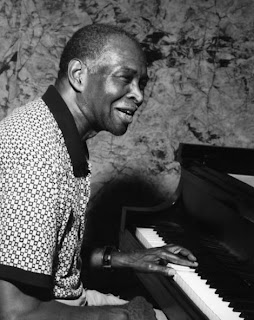Ever since Ornette
Coleman's double quartet, many experiment attempted to organize the
newfound freedom of jazz or cause the power of collective improvisation
-at the core of large groups- to explode.
While Alan Silva worked
on density of resonant layers by superimposing individual sounds, Sun Ra
linked up with tradition of exoticism and fantastic, associated with the
big bands of the thirties.
 |
| Sun Ra |
Moreover, numerous musicians came
together in associations to produce and distribute their own music,
which was said to be hard to sell. One of these, the Chicago-based
Association for the Advancement of Creative Musicians (AACM),
contributed to restarting the dynamism of free jazz just when the
movement had begun to falter. Created in 1965 in Chicago by pianist
Muhal Richard Abrams, the AACM pulled together a variety of figures who
would be prominent in free jazz in seventies.
 |
| Muhal Richard Abrams |
 |
Lee Konitz (front), with Bud Powell, Miles Davis and Art Blakey
(photo: M.Fleiss) |
 |
| Paul Desmond |
|
While the Art
Ensemble of Chicago played on light and shade and on dramatic
organization of time, Anthony Braxton, an AACM member, referred directly
to Eric Dolphy but also to such white musicians as Lee Konitz and Paul
Desmond and to 20th- century classical composers as well. Particularly
popular in Europe during the sixties, Braxton revealed the talents of
many musicians, such as the trombone virtuoso George Lewis and the
pianist Anthony Davis.
 |
| Anthony Braxton |
____________________





Where's the download link for the mp3?
ReplyDelete